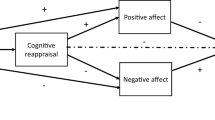Abstract
We compared the relative effects of 5 weeks of either concentration or loving-kindness meditation (CM, LKM) on mindfulness (including two subscales—presence and acceptance) and affect using a multiple baseline ABA design. Hierarchical linear modeling (HLM) indicated that 48–71 % of the total variance was attributable to individual differences. While meditating, CM practitioners experienced progressive increases in mindfulness and acceptance, while LKM practitioners exhibited increases in mindfulness, presence, and positive affect. When practitioners ceased meditation, those in the CM condition declined in mindfulness, acceptance, and positive affect throughout the cessation period. Individuals in the LKM group showed a progressive decrease in presence and a singular drop in negative affect immediately following meditation. There was a dissociation between acceptance and presence, with CM influencing the former and LKM the latter. Because mindfulness and positive affect did not decrease after the meditation period for the LKM group, these results suggest that LKM may induce more enduring changes in these variables. However, while meditation-specific HLMs indicated differences between meditation types, a combined HLM with both meditation conditions showed no group differences in the meditation or cessation phases of the study. More substantial were individual differences in response to meditation; these point to the necessity of using either large sample sizes in group means testing for meditation research or techniques permitting individual-based analysis such as HLM and single-subject designs.



Similar content being viewed by others
References
Baer, R. A., Smith, G. T., Hopkins, J., Krietemeyer, J., & Toney, L. (2006). Using self-report assessment methods to explore facets of mindfulness. Assessment, 13, 27–45.
Baer, R., Smith, G. T., Lykins, E., Button, D., Krietemeyer, J., Sauer, S., Walsh, E., Duggan, D., & Willams, J. M. G. (2008). Construct validity of the five facet mindfulness questionnaire in meditating and non-meditating samples. Assessment, 15(2), 329–342.
Barnhofer, T., Chittka, T., Nightingale, H., Visser, C., & Crane, C. (2010). State effects of two forms of meditation on prefrontal EEG asymmetry in previously depressed individuals. Mindfulness, 1(1), 21–27. doi:10.1007/s12671-010-0004-7.
Brown, K. W., & Ryan, R. M. (2003). The benefits of being present: mindfulness and its role in psychological well-being. Journal of Personality and Social Psychology, 84, 822–848.
Carmody, J., & Baer, R. A. (2008). Relationships between mindfulness practice and levels of mindfulness, medical and psychological symptoms and well-being in a mindfulness-based stress reduction program. Journal of Behavioral Medicine, 31, 23–33. doi:10.1007/s10865-007-9130-7.
Carmody, J., & Baer, R. A. (2009). How long does a mindfulness-based stress reduction program need to be? A review of class contact hours and effect sizes for psychological distress. Journal of Clinical Psychology, 65(6), 627–638. doi:10.1002/jclp.20555.
Carson, J. W., Keefe, F. J., Lynch, T. R., Carson, K. M., Goli, V., Fras, A. M., et al. (2006). Loving-kindness meditation for chronic low back pain. Journal of Holistic Nursing, 23(3), 287–304. doi:10.1177/0898010105277651.
Cohen, J. (1992). A power primer. Psychological Bulletin, 112(1), 155–159.
Cohn, M. A., & Fredrickson, B. L. (2010). In search of durable positive psychology interventions: predictors and consequences of long-term behavior change. Journal of Positive Psychology, 5(5), 355–366.
Davidson, R. J., Kabat-Zinn, J., Schumacher, J., Rosenkranz, M., Muller, D., Santorelli, S. F., Urbanowski, F., Harrington, A., Bonus, K., & Sheridan, J. F. (2003). Alteration in brain and immune function produced by mindfulness meditation. Psychosomatic Medicine, 65, 564–570.
Dedrick, R. F., Ferron, J. M., Hess, M. R., Hogarty, K. Y., Kromrey, J. D., Lang, T. R., Niles, J. D., & Lee, R. S. (2009). Multilevel modeling: a review of methodological issues and applications. Review of Educational Research, 79(1), 69–102.
Dobkin, P. L., Irving, J. A., & Amar, S. (2012). For whom may participation in a mindfulness-based stress reduction program be contraindicated? Mindfulness, 3(1), 44–50. doi:10.1007/s12671-011-0079-9.
Fredrickson, B. L., Cohn, M. A., Coffey, K. A., Pek, J., & Finkel, S. M. (2008). Open hearts build lives: positive emotions, induced through loving-kindness meditation, build consequential personal resources. Journal of Personality and Social Psychology, 95(5), 1045–1062. doi:10.1037/a0013262.
Hutcherson, C. A., Seppala, E. M., & Gross, J. J. (2008). Loving-kindness meditation increases social connectedness. Emotion, 8(5), 720–724. doi:10.1037/a0013237.
Jain, S., Shapiro, S. L., Swanick, S., Roesch, S. C., Mills, P. J., Bell, I., & Schwartz, G. E. R. (2007). A randomized controlled trial of mindfulness meditation versus relaxation training: effects on distress, positive states of mind, rumination, and distraction. Annals of Behavioral Medicine, 33(1), 11–21. doi:10.1207/215324796abm3301_2.
Kohls, N., Sauer, S., & Walach, H. (2009). Facets of mindfulness—results of an online study investigating the Freiburg mindfulness inventory. Personality and Individual Differences, 46(2), 224–230.
Kumar, S., Feldman, G., & Hayes, A. (2008). Changes in mindfulness and emotion regulation in an exposure-based cognitive therapy for depression. Cognitive Therapy and Research, 32(6), 734–744. doi:10.1007/s10608-008-9190-1.
Leppma, M. (2011). The effect of loving-kindness meditation on empathy, perceived social support, and problem-solving appraisal in counseling students. Dissertation, University of Central Florida.
May, C. J., Burgard, M., Mena, M., Abbasi, I., Bernhardt, N., Clemens, S., Curtis, E., Daggett, E., Hauch, J., Housh, K., Janz, A., Lindstrum, A., Luttropp, K., & Williamson, R. (2011). Short-term practice of loving-kindness meditation produces a state, but not a trait, alteration of attention. Mindfulness, 2(3), 143–153. doi:10.1007/s12671-011-0053-6.
Short, E. B., Kose, S., Mu, Q., Borckardt, J., Newberg, A., George, M. S., & Kozel, F. A. (2010). Regional brain activation during meditation shows time and practice effects: an exploratory fMRI study. Evidence-Based Complementary and Alternative Medicine, 7(1), 121–127.
Walach, H., Buchheld, N., Buttenmuller, V., Kleinknecht, N., & Schmidt, S. (2006). Measuring mindfulness—the Freiburg mindfulness inventory (FMI). Personality and Individual Differences, 40, 1543–1555.
Watson, D., Clark, L. A., & Tellegen, A. U. (1988). Development and validation of brief measures of positive and negative affect: the PANAS scales. Journal of Personality and Social Psychology, 54(6), 1063–1070.
Author information
Authors and Affiliations
Corresponding author
Rights and permissions
About this article
Cite this article
May, C.J., Weyker, J.R., Spengel, S.K. et al. Tracking Longitudinal Changes in Affect and Mindfulness Caused by Concentration and Loving-kindness Meditation with Hierarchical Linear Modeling. Mindfulness 5, 249–258 (2014). https://doi.org/10.1007/s12671-012-0172-8
Published:
Issue Date:
DOI: https://doi.org/10.1007/s12671-012-0172-8




